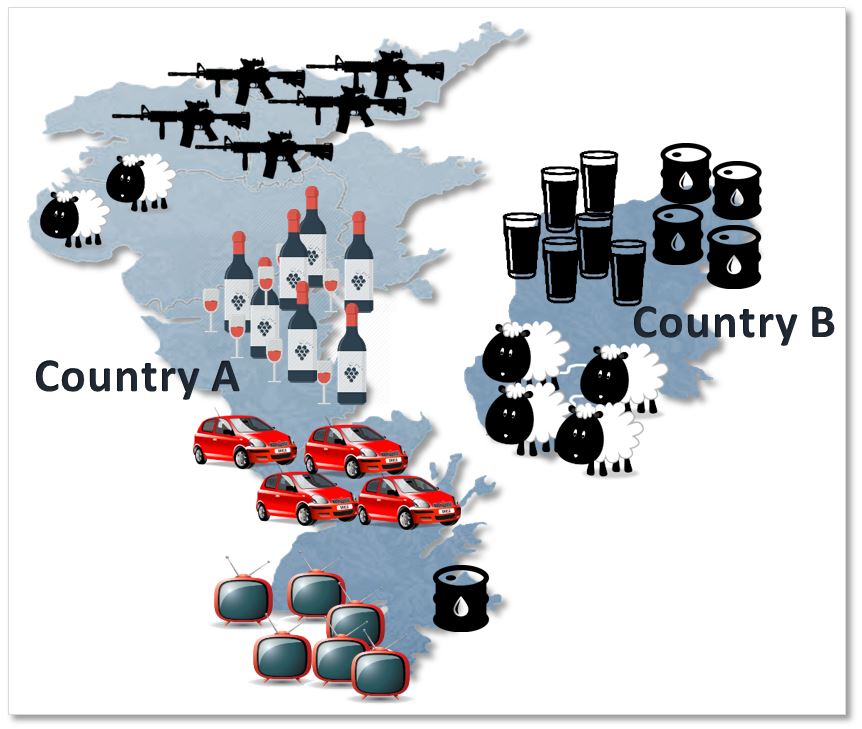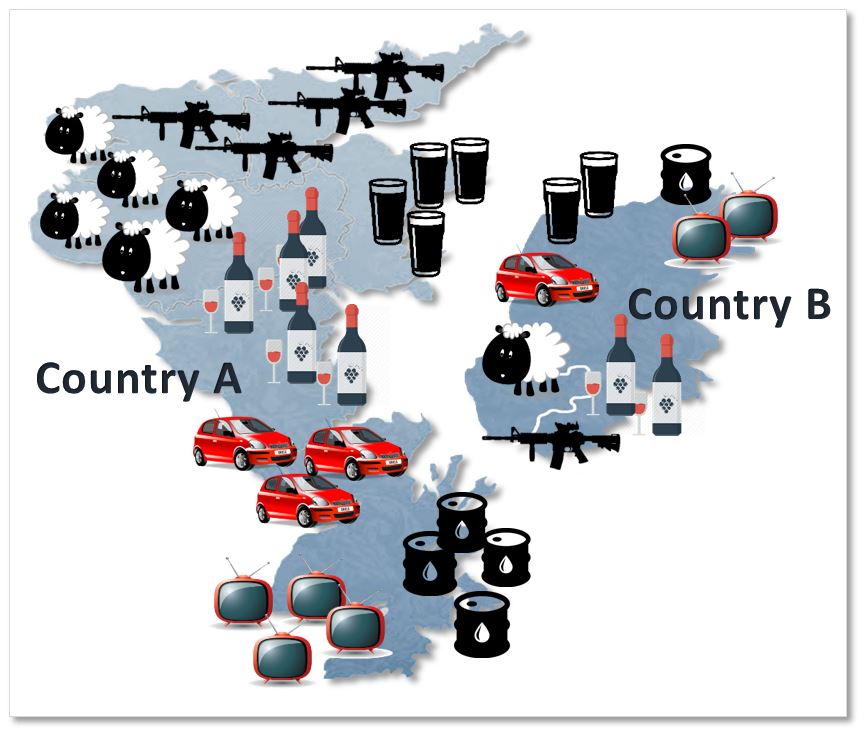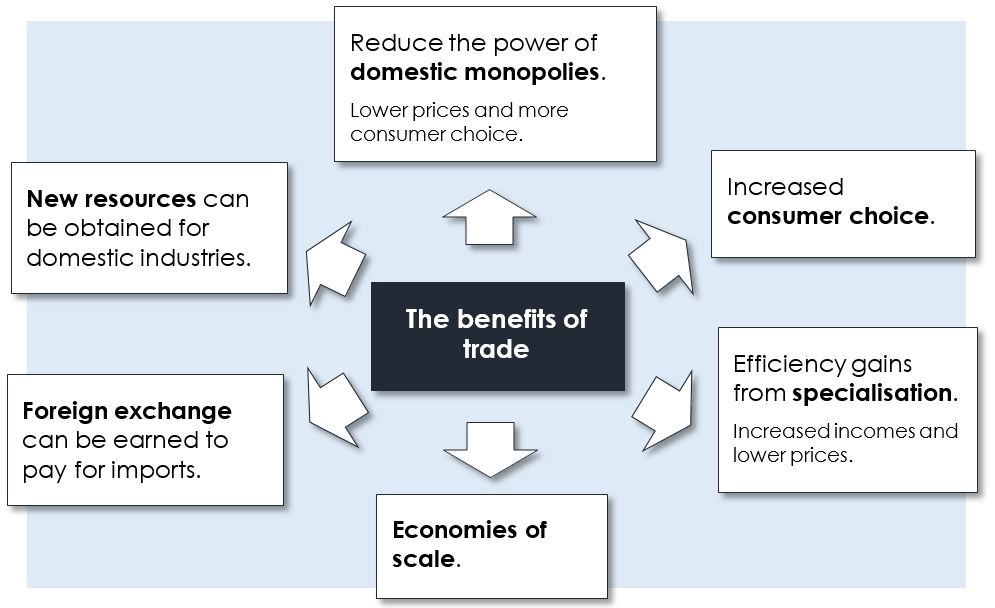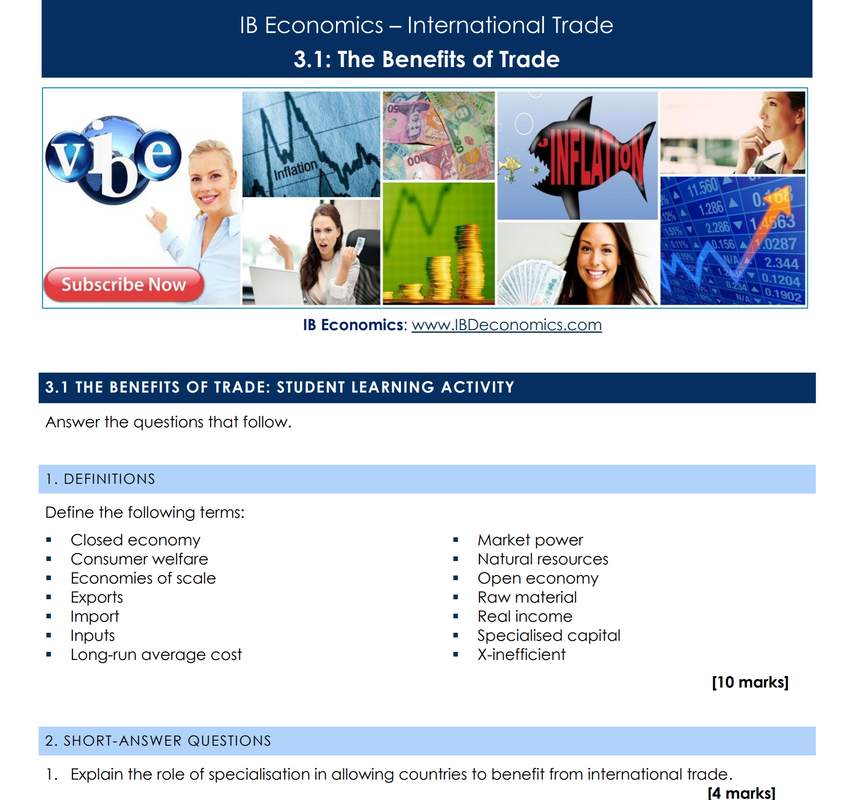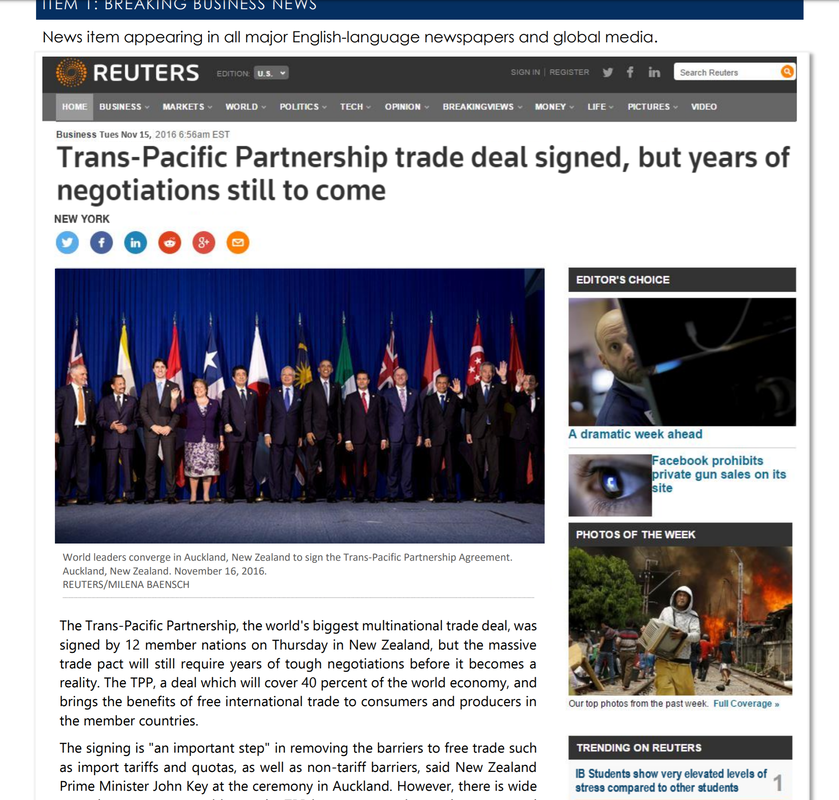IB Diploma Economics:
|
|
The Gains From Trade
What is trade?
World Trade
|
International Trade
|
|
Figure 1: Different countries have different resources and can produce different goods and services, in different quantities. Without international trade, only what is produced by the country can be consumed.
|
Figure 2: International trade enables the producers and consumers of different countries to purchase goods, services and resources they do not have or do not have in sufficient quantities.
|
The Benefits of world trade
|
Why do countries trade?
|
The gains from trade
International trade enables the producers and consumers of different countries to purchase goods, services and resources they do not have or do not have in sufficient quantities. Countries such as Saudi Arabia, the US and Russia have vast oil and gas resources, other countries such South Korea, Germany and Turkey have virtually no proven oil reserves. As these countries require oil and gas, they must purchase it from the oil producing countries. This holds true for many other goods and services. For example, some foods such as cocoa for chocolate can only be grown in equatorial climates, and others such as cod can only be found in chilly subarctic waters such as that off the coast of Iceland or Canada. Not all countries will have important raw materials or resources such as copper (Peru and Chile) and iron ore (Australia and Canada) necessary for manufacturing other goods such as steel and electronics.
Counties may be able to produce goods and services, but do so less well than other countries. For example, wine can, and is, made in the UK but wine made in the UK is comparatively less efficient (lower productivity), higher unit costs and the product is generally of lower quality than wine made in France. Thus, France specialises in the production of wine because the land, climate, technical knowledge and skilled labour results in more productive use of France’s factors of production. The UK excels in the production of financial services (e.g., banking, share broking and insurance) as the UK’s factors of production are better suited to this specialty. South Korea has very limited natural resources. It imports raw materials and specialises in using its factors of production into sophisticated electronics and consumer goods which it then exports to the rest of the world. These exported goods and services then enable South Korea to earn foreign exchange which it requires to purchase the necessary raw materials to use in its manufacturing industries – a virtuous circle. Essential Statement: Foreign exchange is earned by exporting which, in turn, can be used to purchase the imported resources its producers need and the goods and services its consumers require. Essential Statement: International trade results in increased production efficiencies and lower prices for all firms and industries that are faced with international competition in a free market. Firms and industries must be productively efficient when exposed to international competition to be profitable and competitive. |
Essential Statement: Increased efficiency, greater consumer choice and lower prices are the resulting benefits from international trade. These benefits are driven by economies of scale and increased competition. Export receipts provide the foreign exchange needed to purchase goods, services and resources that a country does not have sufficient quantities of. Consumer choice increases with international trade. Consumers can purchase a wide variety of imported goods and services from almost any country in the world. These are goods and services that would not be consumed if countries did not trade with each other. International trade increases consumer welfare as wants are better able to be satisfied.
Economies of scale can be reaped as a global mass market is opened up to firms and industries that export goods and services. With such a mass market, production can be expanded and highly efficient technology can be employed in mass production lines. The sophisticated and capital intensive robotics employed in Japanese car manufacturing would be a classic example of such production technologies. Employing such highly specialised and expensive capital resources does not make financial sense on smaller scales, and it is only when goods and services can be produced in quantities sufficient to lower the average total cost of each product, that such investments by firms begin to make financial sense. These lower costs add to the profitability of firms and increase worldwide supply, at the same time prices charged to consumers decrease and demand increases. With international trade countries can specialise in producing those goods and services they can produce the most efficiently with the resources they have (e.g., cars in Japan and wine in France). International trade enables countries to produce more specialised goods and services and export surpluses to the rest of the world. Combined with international treading, such specialisation maximises the global output of goods and services from any given amount of resources. Thus productivity increases, and less inputs are required to produce the same quantities of goods and services, and/or more goods and services can be produced with the same quantities of inputs. Thus, specialisation enables each good and service to be produced at the lowest average cost which, again, increases profits and/or decreases prices to consumers in competitive markets. Specialisation and international trade increases real incomes and results in lower prices – obviously, a very major gain from trade. In a closed economy, a domestic monopoly will have enough market power influence price. A monopoly firm can increases prices directly or indirectly by limiting the supply of a good or service – a decrease in demand results in an increase in price. High levels of profitability can often be achieved in an unregulated domestic monopoly, and because of this, these types of firms can be X-inefficient – average cost is greater than the minimum that would otherwise be achieved in a competitive environment. Whereas, in a country open to international trade, such domestic monopolies will face competition from (often highly efficient) international competitors. For domestic industries to survive and be profitable, product quality and efficiencies must be made to reduce average cost in order to be price competitive with imported goods and services. |
IB Economics 3.1 The Benefits of Trade
Summary Notes
IB Economics - 3.1 The Benefits of Trade teaching and learning PowerPoint notes for HL and SL IB Diploma Economics.
IB Economics 3.1 The Benefits of Trade Video Tutorial
PROGRESS CHECK - TEST YOUR UNDERSTANDING BY COMPLETING THE ACTIVITIES BELOW
You have below, a range of practice activities, flash cards, exam practice questions and an online interactive self test to ensure you have complete mastery of the IB Economics requirements for the International Economics – International Trade: 3.1 The benefits of trade topic.
IB Economics interactive QUIZZES AND TWO CLASSROOM GAMES
|
Test how well you know the IB Economics International Economics – International Trade: 3.1 The benefits of trade topic with the interactive self-assessment quizzes below. Aim for a score of at least 80 per cent.
|



